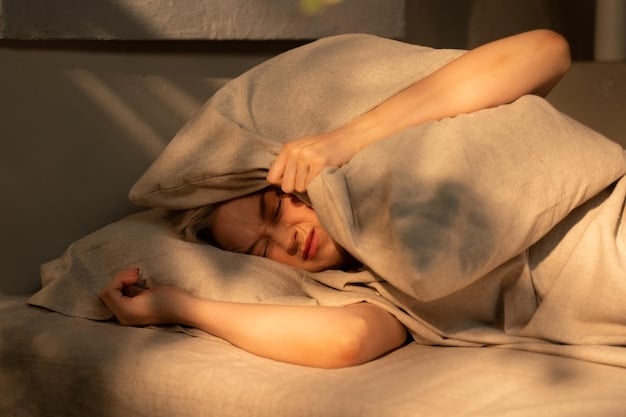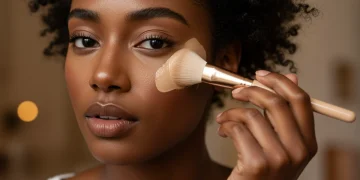The Ultimate Guide to Beauty Sleep: Sleep’s Role in Skincare

Advertisements
Sleep plays a crucial role in your skincare routine by allowing your body to repair and regenerate skin cells, reduce inflammation, and improve overall complexion, making quality sleep essential for achieving healthy and radiant skin.
Unlocking radiant skin goes beyond topical creams and serums; it’s deeply intertwined with the restorative power of sleep. The role of sleep in your skincare routine: how to get your beauty rest is often underestimated, yet it’s a cornerstone of a healthy, glowing complexion.
Advertisements
Understanding the Sleep-Skin Connection
The relationship between sleep and skin health is profound. When we sleep, our bodies enter a restorative phase, repairing damage and regenerating cells. This process has a direct impact on our skin’s appearance and resilience.
The Science Behind Sleep and Skin
During sleep, the body produces hormones like melatonin, which acts as an antioxidant, fighting off free radicals that can damage skin cells. Simultaneously, cortisol, the stress hormone, decreases, reducing inflammation and preventing breakouts.
Key Processes During Sleep
Sleep enables several crucial skin-related processes:
- Cell Regeneration: Skin cells regenerate at a faster rate during sleep, repairing daily damage.
- Collagen Production: Collagen, essential for skin elasticity, is boosted while you sleep.
- Hydration Balance: Sleep helps regulate hydration levels, preventing dryness and dullness.
Neglecting sleep disrupts these processes, leading to premature aging, increased sensitivity, and a lackluster complexion. Prioritizing sleep is not just about feeling rested; it’s an investment in long-term skin health.

The Impact of Sleep Deprivation on Your Skin
Chronic sleep deprivation takes a noticeable toll on the skin. From dark circles to increased acne, the signs of inadequate sleep are often written all over our faces.
Common Skin Issues from Lack of Sleep
Sleep deprivation manifests in various skin problems:
- Dark Circles: Reduced sleep leads to poor circulation, causing blood to pool under the eyes.
- Dull Complexion: Insufficient sleep impairs cell turnover, resulting in a lackluster appearance.
- Increased Breakouts: Elevated cortisol levels trigger inflammation and oil production, leading to acne.
Long-Term Effects of Poor Sleep
Consistent sleep deprivation can accelerate aging and weaken the skin’s protective barrier, making it more vulnerable to environmental stressors. It’s essential to recognize these effects and take steps to improve sleep quality.
Creating a Bedtime Skincare Ritual
Establishing a consistent bedtime skincare routine can maximize the benefits of sleep for your skin. This routine should focus on cleansing, nourishing, and repairing the skin.
Essential Steps for a Nighttime Routine
A well-rounded nighttime skincare routine includes:
- Cleansing: Remove makeup and impurities to prevent clogged pores.
- Treatment: Apply serums or treatments targeting specific concerns like wrinkles or hyperpigmentation.
- Moisturizing: Hydrate the skin with a rich night cream to lock in moisture.
Choosing the Right Products
Select products with ingredients that support skin repair and regeneration, such as retinoids, peptides, and antioxidants. Avoid harsh chemicals that can irritate the skin.
Incorporating these steps into your routine ensures that your skin receives the care it needs to rejuvenate overnight, complementing the restorative benefits of sleep. This proactive approach will help you wake up with a fresh and revitalized complexion.
Optimizing Your Sleep Environment for Better Skin
The environment in which you sleep significantly affects your skin’s health. Creating a sleep sanctuary can enhance the benefits of your nightly skincare routine.
Tips for a Skin-Friendly Sleep Environment
Consider these factors to optimize your sleep environment:
- Temperature: Keep your bedroom cool (around 65°F or 18°C) to promote better sleep and reduce inflammation.
- Humidity: Use a humidifier to maintain optimal moisture levels and prevent dry skin.
- Clean Bedding: Wash your pillowcases regularly to minimize bacteria and prevent breakouts.
The Role of Sleep Posture
Sleeping on your back can reduce wrinkles and prevent pressure on the face, minimizing the formation of sleep creases. Using a silk pillowcase can further reduce friction and prevent hair breakage.

Dietary and Lifestyle Factors Influencing Sleep and Skin
What you eat and how you live can significantly impact both your sleep quality and skin health. A holistic approach that combines a healthy diet with mindful lifestyle choices is essential.
Foods That Promote Sleep and Skin Health
Including these foods in your diet can improve sleep and enhance skin health:
- Antioxidant-Rich Foods: Berries, leafy greens, and nuts fight free radicals and promote collagen production.
- Omega-3 Fatty Acids: Fish, flaxseeds, and chia seeds reduce inflammation and support skin hydration.
- Hydrating Foods: Watermelon, cucumbers, and celery keep the skin moisturized from within.
Lifestyle Adjustments for Better Sleep and Skin
Making simple lifestyle changes can make a big difference:
- Limit Screen Time: Blue light from electronic devices disrupts melatonin production, hindering sleep.
- Stay Hydrated: Drink plenty of water throughout the day to keep skin hydrated.
- Manage Stress: Practice relaxation techniques like yoga or meditation to reduce cortisol levels.
These dietary and lifestyle adjustments work synergistically to improve sleep quality and promote healthy, radiant skin. Consistency is key to seeing long-term benefits.
Supplements to Support Sleep and Skin Health
Certain supplements can provide additional support for sleep and skin health, complementing a balanced diet and healthy lifestyle.
Key Supplements for Better Sleep and Skin
Consider these supplements to enhance your sleep and skin quality:
- Melatonin: Helps regulate the sleep-wake cycle and provides antioxidant benefits.
- Collagen: Supports skin elasticity and reduces the appearance of wrinkles.
- Vitamin C: Boosts collagen production and protects against free radical damage.
Precautions and Recommendations
Always consult with a healthcare professional before starting any new supplement regimen, especially if you have underlying health conditions or are taking other medications. It’s crucial to ensure that the supplements are safe and appropriate for your individual needs.
Using supplements in conjunction with a healthy lifestyle and skincare routine can optimize your overall skin health and sleep quality, leading to a more radiant and rested appearance.
| Key Point | Brief Description |
|---|---|
| 😴 Sleep Quality | Enhances skin repair and collagen production. |
| 🌙 Nighttime Routine | Supports rejuvenation with cleansing, treatment, and moisture. |
| 🛏️ Sleep Environment | Optimized with cool temp, humidity, and clean bedding. |
| 🍎 Diet & Lifestyle | Balanced with foods rich in antioxidants and mindful habits. |
What is the ideal sleep duration for skin health?
Sleeping on your back is generally recommended to minimize wrinkles and pressure on the face. This prevents the formation of sleep creases and reduces friction, leading to smoother skin over time.
Ingredients like retinoids, peptides, and hyaluronic acid are excellent for nighttime use. Retinoids promote cell turnover, peptides boost collagen, and hyaluronic acid provides deep hydration, enhancing skin repair during sleep.
Yes, sleep deprivation can exacerbate skin conditions like eczema and psoriasis. Elevated stress hormones from lack of sleep can trigger inflammation, leading to flare-ups and increased sensitivity in affected areas.
Maintain a cool, dark, and quiet bedroom. Use a humidifier to keep the air moist, and ensure your bedding is clean and hypoallergenic. These conditions promote restful sleep and reduce skin irritation.
Avoid consuming sugary or caffeinated beverages before bed, as they can disrupt sleep patterns and increase inflammation. Also, refrain from using electronic devices close to bedtime to minimize blue light exposure.
Conclusion
Prioritizing sleep is a fundamental aspect of any effective skincare routine. By understanding the intricate connection between sleep and skin health, creating a bedtime ritual, optimizing your sleep environment, and adopting healthy sleep habits, you can unlock the full potential of beauty sleep and achieve a radiant, healthy complexion.





